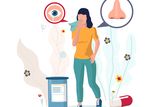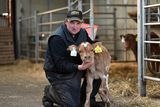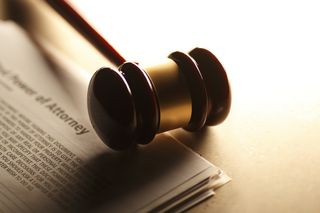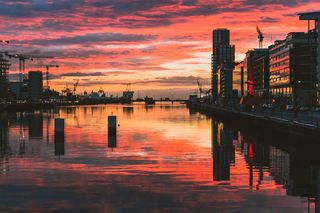The 12 steps... how Alcoholics Anonymous began
Eighty years ago, two strangers with alcohol addictions talked on the phone and found support in each other. This was the beginning of Alcoholics Anonymous, which today has more than two million members around the world
Eighty years ago, in June 1935, a Wall Street broker found himself in Akron, Ohio. Bill Wilson, a previously much-hospitalised alcoholic destined for, in his own words, "the asylum or the undertaker", had stopped drinking six months earlier. He described his alcoholism as "an obsession of the mind that condemned me to drink against my will, so that if I continued to drink I would go mad or die". Pre 1935, those were your choices - alcoholics ended up either on the locked ward or the park bench, and almost always in an early grave. But Bill Wilson had managed to stop drinking by making a simple, but profound, realisation - the only thing that could keep him sober was talking to another alcoholic.
Today, this might sound fairly obvious, but back then, once you had finished drying out in a "jitter joint", after the administration of a belladonna treatment known as "puke and purge", you were on your own. You could get help to stop drinking, but there was nothing to help you with the hardest bit - staying stopped.
Bill, after 17 years of progressive alcoholism, had experienced a quasi-spiritual epiphany while detoxing in hospital, followed by the realisation that he needed other drunks in order not to drink. Then, months later, passing through distant Akron, in the aftermath of a failed business deal, he was overcome by the urge to hit the bar. He needed to talk to someone. To another alcoholic.
Founding fathers
He rang Robert Smith - Dr Bob, the other co-founder of Alcoholics Anonymous - after getting the doctor's number from a mutual acquaintance who knew that Bob had a drink problem. Bob was very suspicious, and decided to give Bill just a few minutes on the phone, before politely hanging up. Instead, they recognised the addict in each other, and the conversation led to the formation of Alcoholics Anonymous. The hotel where they first talked was called the Mayflower - befitting for the founding fathers of 12-step recovery.
From two men talking on the phone in the Midwest in 1935, today there are around two million members of Alcoholics Anonymous in 150 countries around the world, although it's probably more - nobody knows exactly how many people to go AA because the organisation does not keep any formal records, has no formal hierarchy, does not have any paid employees (apart from a tiny handful of head office administrators), and does not use surnames.
It does not have any outside financial backing, any political or religious alliances, opinions on external matters, or requirements for membership, other than being sick to death of drinking but being unable to stop.
Russell Brand calls 12-step recovery groups a perfect example of anarcho-syndicalism at work; each group is independent, self-supporting through its own donations, and governed by principles - known as the 12 Traditions - rather than individuals. In that respect, it is the opposite of politics - there are no shouty leaders, no public representatives, spokespeople, advertisements or PR officers.
Anonymity takes care of all that, plus the central tenet of 'attraction not promotion'. Everyone is equal, and those who help run the organisation do so voluntarily and temporarily. There are no stars, no names, no faces - just anonymous democracy.
Although AA is the mothership of 12-step abstinence-based recovery - Bill Wilson wrote the 12 Steps, along with other founder members of the fellowship, as the message spread beyond Akron and New York - these steps have gone on to form the basis of a plethora of other support groups.
You'll probably have heard of the longer established ones, like Narcotics Anonymous and Overeaters Anonymous, but there are many more, continuously developing as the need arises - the newest is probably Online Gamers Anonymous, founded in the US in 2002.
But it's not just for those who directly experience addictive or compulsive behaviours. Anyone who has ever lived with an active addict - booze, drugs, food, sex, money, relationships, work, whatever -knows what an all-encompassing vortex of destruction and/or frustration it can be; with alcoholism alone, around 10pc of the population is alcohol dependent, which makes for a lot of families living with problem drinking. That's before you even consider all the other addictions, from crack to cake.
Bill Wilson's wife Lois founded Al-Anon for the families and loved ones driven to distraction by living with the dispiriting Jekyll and Hyde aspects of active alcoholism. Rather than admitting that you were powerless over alcohol, you admitted you were powerless over the alcoholic in your life. You could not change them. Instead, you could find support from other people with similar situations, and find the strength to 'detach with love'. From Al-Anon came Alateen, for the children of alcoholics, and Adult Children of Alcoholics. Then came Codependents Anonymous, and Codependents of Sex Addicts.
So what exactly are the 12 steps? Here are some common misconceptions: that you have to become a God botherer; that you have to say sorry to everyone you have ever fallen out with; that you have to go all happy-clappy goody-goody.
The god thing
The infamous "God thing" is what new people often cite as most off-putting - they have come to get recovery from addiction, not to find God. It is quickly explained that "God" is just shorthand for a power greater than the individual addict; it can be anything. You choose it yourself.
The 12 Steps are based loosely on Christian, Buddhist and Jungian ideas, and can be divided into four stages. The biggie is the first one - admitting that you actually have a problem in the first place, and that you are powerless over it. As for the God thing, even the most befuddled individual can usually see that they themselves are not a supreme being.
Once you have acknowledged that you have a problem and that you are personally not God - basically, steps one, two and three - you have a look at your behaviour patterns, and how everything going wrong in your life is not always everyone else's fault. This takes you from step four to step seven.
Now comes the bit that makes people wilt in horror - making amends to those you have mightily irritated during your active addiction. This is step nine (step eight involves making the list). However, you do not march about with a clipboard ticking people off as you say sorry to them. It's a far slower, more organic process that happens only when, and if, it feels natural.
The last three steps - 10, 11 and 12 - are about keeping yourself mindful and conscious, and passing the message to others who wish to recover. Connecting with others counteracts isolation, which is a huge part of addiction.
But why bother doing them in the first place? Why not just go to 12-step meetings and hang out with others with similar issues? Isn't that enough? The short answer is usually 'no'.
Despite no formal records being kept within 12-step recovery programmes, anecdotally, it is people who do the steps who have the most long-term recovery. Or as one member of AA puts it: "Going to meetings, but not doing the steps, is like going to the doctor but not taking the medicine."
They remain the principal method of recovery used in treatment centres around the world. In Ireland, both Tabor Lodge and the Rutland Centre believe the 12 Steps to be a solid basis for recovery, given how the programme advocates taking personal responsibility, being emotionally honest, helping others, and existing beyond your own self-will.
Perhaps the strongest attribute of 12-step recovery is its inclusiveness and acceptance. In 1945, an African-American transvestite in a dress and blonde wig turned up on the doorstep of a very early meeting of Alcoholics Anonymous.
Not quite knowing what do to - in those racially segregated, homophobic days, the embryonic organisation consisted almost entirely of straight white male drunks - someone rang Bill Wilson. Bill asked if the man in the dress had a desire to stop drinking. When the man said 'yes', he was warmly welcomed.
Bill Wilson himself was a life-long sex addict, adulterer and long-term depressive, a mercurial and impulsive character, brilliant at making money, ever more brilliant at losing it.
The organisation he co-founded - and all its subsequent offshoots - would never have worked had they been based on saintliness. Instead, they run on human flaws and frailty, in all their glorious, infuriating manifestations.
12 Step Recovery stories
FOOD
"I was six stone overweight and couldn't stop eating. I was obsessed with food - I would plan secret binges. My wife was fed up with my mood swings and I'd totally lost my confidence. I tried weight-loss groups but they didn't work for me - at least not long term, and then someone took me to a food fellowship meeting and it was a revelation. Instead of calorie-counting, people were talking about their feelings. Food abstinence meant no more sugar or white flour, which were the things that set off my binges. So far, I have lost almost all my excess weight, but it's not just about the external stuff. I feel really good on the inside as well."
- 'Jonathan' (43)
SEX
"The cliché of a sex and love addict is some bunny boiler nymphomaniac, but really it was more mundane and miserable than that. I had to take a huge step back from my behaviour patterns - in my case, short-term destructive relationships - and do a sort of emotional detox and inventory. I hope that one day I can form a loving partnership with someone, but not yet. I'm not ready."
- 'Jayne' (33)
GAMBLING
"I was gambling my salary online and hiding it from my husband. When he found out my level of debt, he freaked, so I was kind of pressured towards a 12-step programme, but I absolutely could not get on with it at all. It seemed intrusive and overly personal and there were constant references to God. I found it impossible to talk within a group. But it spurred me on to do something about my gambling, and so I saw a private counsellor instead and did a course of CBT [cognitive behavioural therapy]. So far, so good."
- 'Gina' (40)
DRUGS
"I started very young with glue and solvents and was addicted to Class As by my late teens. I went to prison because I had to commit crime - burglary - to pay for my addiction. I was desperate to stop, especially when my girlfriend had our first child, but I couldn't stop relapsing. I eventually got a place in a 12-step residential treatment centre, and have been clean for over a year now. I know that if I stopped working on my recovery for even a few days, things would slide. I've seen it happen to friends. They stop going to meetings, and they're bang at it [drugs] again. I have too much to lose now."
- 'Mac' (28)
CO-DEPENDENCY
"I come from a big family of alcoholics - both my parents and most of my siblings, including myself. I got sober years ago, but realised I was constantly caught up in the drama of family members and friends, and running myself ragged. I was a massive people-pleaser, and always saying yes, then burning up with resentment. I had no boundaries, and it got to the point where I felt like drinking again myself, even though I had done the 12 Steps around my own alcoholism. Looking at my co-dependency via the same process was an eye-opener."
- 'Ruth' (47)
Join the Irish Independent WhatsApp channel
Stay up to date with all the latest news














